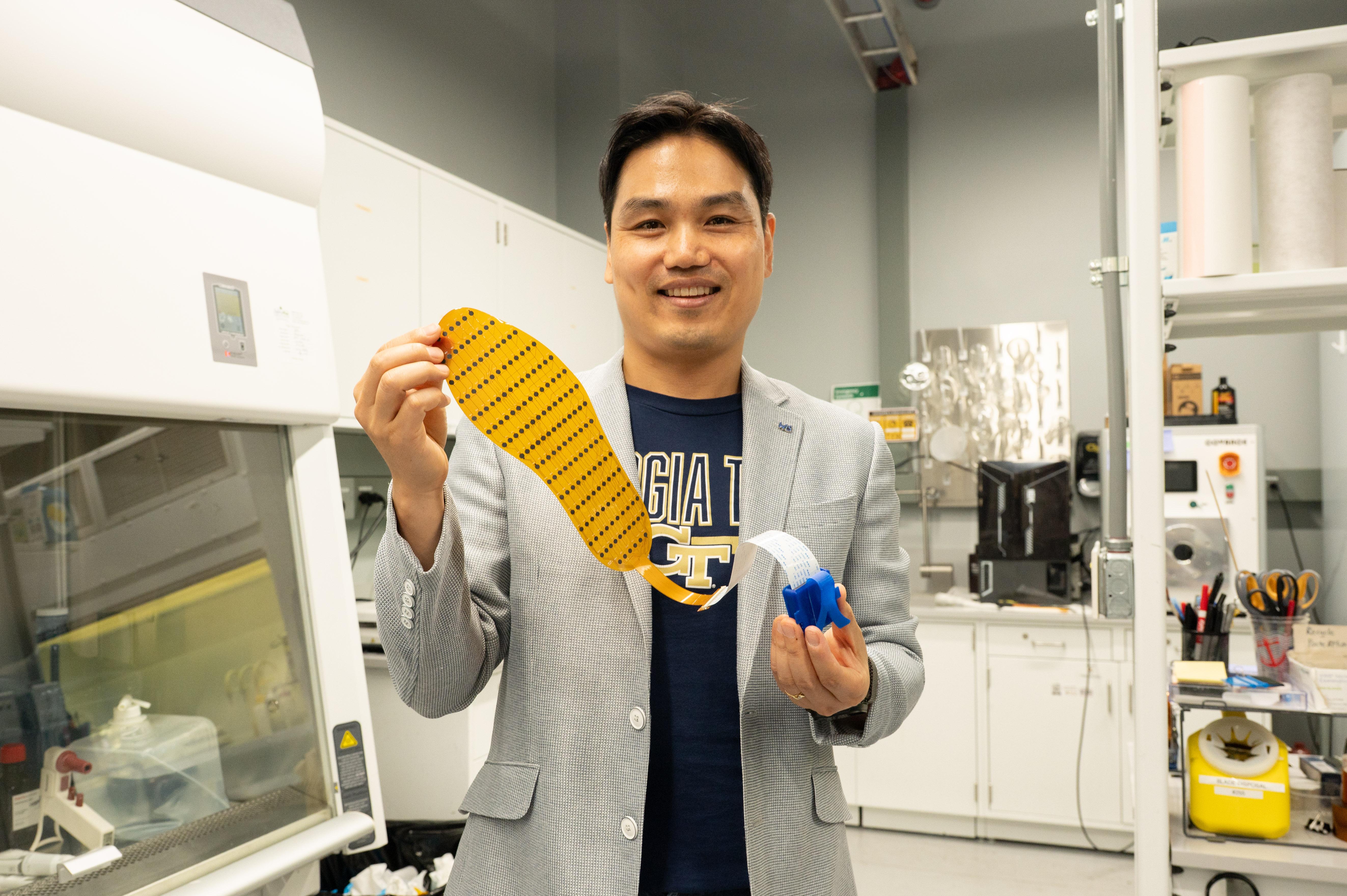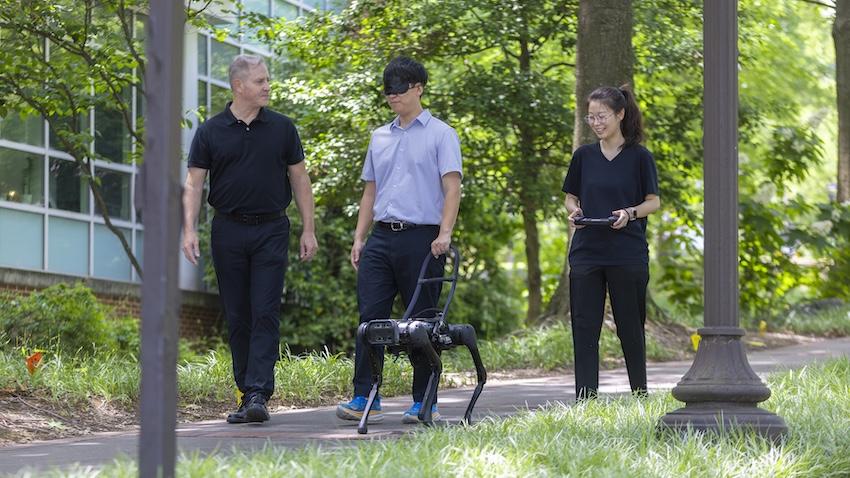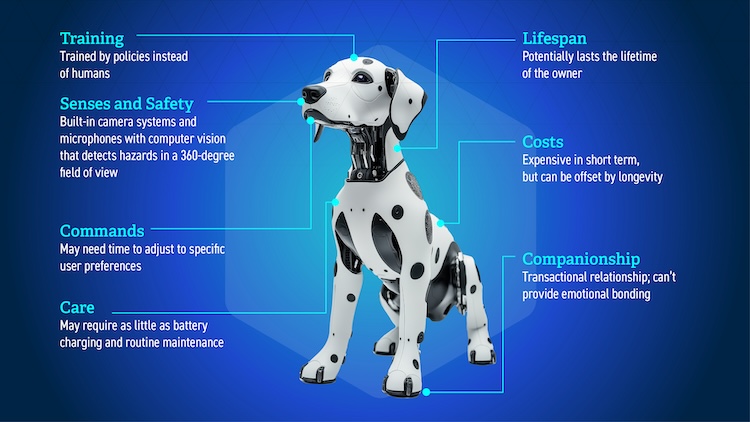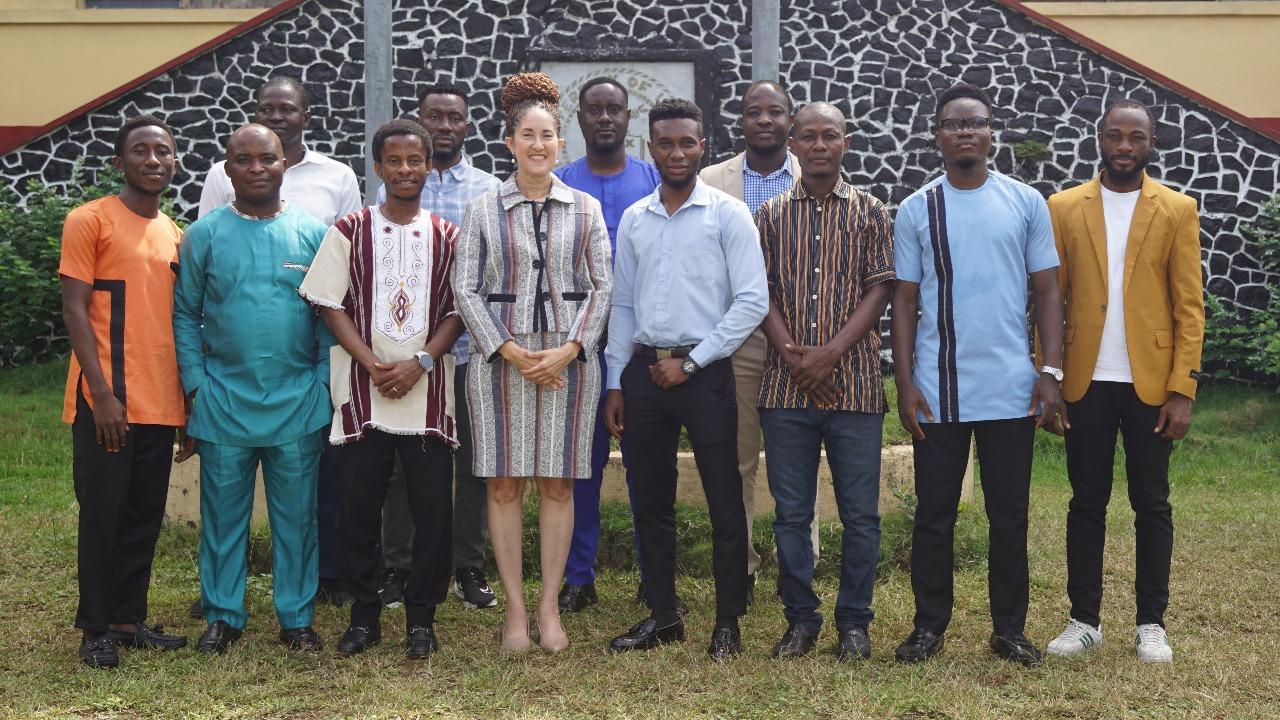CANCELLED--Trust: The Foundation of AI Industrialization
TALK CANCELLED and POSTPONED TO SPRING 2026
A Step Forward: New Smart Shoe Insert Could Improve Mobility for People With Walking Problems
Sep 18, 2025 —

Hong Yeo holds the wearable electronic device made of more than 170 thin, flexible sensors that measure foot pressure — a key metric for determining whether someone is off-balance. [Photos by Joya Chapman]
Maintaining balance while walking may seem automatic — until suddenly it isn’t. Gait impairment, or difficulty with walking, is a major liability for stroke and Parkinson’s patients. Not only do gait issues slow a person down, but they are also one of the top causes of falls. And solutions are often limited to time-intensive and costly physical therapy.
A new wearable electronic device that can be inserted inside any shoe may be able to address this challenge. The device, developed by Georgia Tech researchers, is made of more than 170 thin, flexible sensors that measure foot pressure — a key metric for determining whether someone is off-balance. The sensor collects pressure data, which the researchers could eventually use to predict which changes lead to falls.
The researchers presented their work in the paper, “Flexible Smart Insole and Plantar Pressure Monitoring Using Screen-Printed Nanomaterials and Piezoresistive Sensors.” It was the cover paper in the August edition of ACSApplied Materials & Interfaces.
Pressure Points
Smart footwear isn’t new — but making it both functional and affordable has been nearly impossible. W. Hong Yeo’s lab has made its reputation on creating malleable medical devices. The researchers rely on the common commercial practice of screen-printing electronics to screen-print sensors. They realized they could apply this printing technique to address walking difficulties.
“Screen-printing is advantageous for developing medical devices because it's low-cost and scalable,” said Yeo, the Peterson Professor and Harris Saunders Jr. Professor in the George W. Woodruff School of Mechanical Engineering. “So, when it comes to thinking about commercialization and mass production, screen-printing is a really good platform because it's already been used in the electronics industry.”
Making the device accessible to the everyday user was paramount for Yeo’s team. A key innovation was making sure the wearable is thin enough to be comfortable for the wearer and easy to integrate with other assistive technologies. The device uses Bluetooth, enabling a smartphone to collect data and offer the future possibility of integrating with existing health monitoring applications.
Possibilities for real-world adaptation are promising, thanks to these innovations. Lightweight and small, the wearable could be paired with robotics devices to help stroke and Parkinson’s patients and the elderly walk. The high number of sensors could make it easier for researchers to apply a machine learning algorithm that could predict falls. The device could even enable professional athletes to analyze their performance.
Regardless of how the device is used, Yeo intends to keep its cost under $100. So far, with funding from the National Science Foundation, the researchers have tested the device on healthy subjects. They hope to expand the study to people with gait impairments and, eventually, make the device commercially available.
“I'm trying to bridge the gap between the lack of available devices in hospitals or medical practices and the lab-scale devices,” Yeo said. “We want these devices to be ready now — not in 10 years.”
With its low-cost, wireless design and potential for real-time feedback, this smart insole could transform how we monitor and manage walking difficulties — not just in clinical settings, but in everyday life.

Tess Malone, Senior Research Writer/Editor
tess.malone@gatech.edu
First Day of Classes: Spring 2026
First day of classes for the semester.
Chinese New Year
Chinese New Year is an important traditional Chinese holiday. In China, it is also known as the Spring Festival, the literal translation of the modern Chinese name.
New Year's Day Holiday
Georgia Tech will be closed in observance of the New Year's Day holiday.
MLK Jr. National Holiday
Georgia Tech will be closed in observance of the M.L.K, Jr. National Holiday.
Wearable Health Equity Workshop: Rural Healthcare and Wellbeing
AGENDA
08:30 - 09:00 Registration
09:00 - 10:00 Morning Keynote, Dr. Phillipp Gutruf
10:00 - 10:15 Break
10:15 - 11:30 Technology Panel
11:30 - 01:00 Poster and lunch
01:00 - 02:00 Research Presentations
02:00 - 03:00 Afternoon Keynote, Dr. Kimberlee McKay
03:00 - 03:15 Break
Project 159 with Tim Lieuwen
Join us as Tim Lieuwen, executive vice president of research at Georgia Tech, discusses “Project 159” where Georgia Tech aspires to engage with each of Georgia’s 159 counties. This event is hosted by the Georgia Tech Institute for People and Technology and is sponsored by Tech Square Atlanta and Collaborative Real Estate.
To attend, register here >>
Georgia Tech Team Designing Robot Guide Dog to Assist the Visually Impaired
Sep 10, 2025 —

People who are visually impaired and cannot afford or care for service animals might have a practical alternative in a robotic guide dog being developed at Georgia Tech.
Before launching its prototype, a research team within Georgia Tech’s School of Interactive Computing, led by Professor Bruce Walker and Assistant Professor Sehoon Ha, is working to improve its methods and designs based on research within blind and visually impaired (BVI) communities.
“There’s been research on the technical aspects and functionality of robotic guide dogs, but not a lot of emphasis on the aesthetics or form factors,” said Avery Gong, a recent master’s graduate who worked in Walker’s lab. “We wanted to fill this gap.”
With training a guide dog costing up to $50,000, few BVI individuals can afford one, and even fewer can afford to care for and feed it. The dog also has fewer than 10 working years before it needs replacement.
Gong co-authored a paper on the design implications of the robotic guide dog that was presented at the 2025 International Conference on Robotics and Automation (ICRA) in Atlanta in May.
The consensus among the study’s participants indicates they prefer a robotic guide dog that:
- resembles a real dog and appears approachable
- has a clear identifier of being a guide dog, such as a vest
- has built-in GPS and Bluetooth connectivity
- has control options such as voice command
- has soft textures without feeling furry
- has long battery life and self-charging capability
“A lot of people said they didn’t want the dog to look too cute or appealing because it would draw too much attention,” said Aviv Cohav, another lead author of the paper and recent master’s graduate.
“Many people have issues with taking their guide dog to places, whether it’s little kids wanting to play with the dog or people not liking dogs or people being scared of them, and that reflects on the owners themselves. We wanted to look at what would be a good balance between having a functional robot that wouldn’t scare people away or be a distraction.”
The researchers also had to consider the perspectives of sighted individuals and how society at large might view a robotic guide dog.
An example of this is the amount of noise the dog makes while walking. The owner needs to hear the dog is active, but the clanky sound many off-the-shelf robots make could create disturbances in indoor spaces that amplify sounds. To offset the noise, the team developed algorithms that allow the robot to move more quietly.
Walker and his lab have examined similar scenarios that must take public perception into account.
“We like to think of Georgia Tech as going the extra mile,” Walker said. “Let’s not just make a robot, but a robot that’s going to fit into society.
“To have impact, the technologies we produce must be produced with society in mind. This is a holistic design that considers the users and all the people with whom the users interact.”
Taery Kim, a computer science Ph.D. student, began working on the concept of a robotic guide dog when she came to Georgia Tech in 2022. She and Ha, her advisor, have authored papers on building the robot’s navigation and safety components.
“When I started, I thought it would be as simple as giving the guide dog a command to take me to Starbucks or the grocery store, and it would just take me,” Kim said. “But the user must give waypoint directions — ‘go left here,’ ‘turn right,’ ‘go forward,’ ‘stop.’ Detailed commands must be delivered to the dog.”
While a real dog has naturally enhanced senses of hearing and smell that can’t be replicated, technology can provide interconnected safety features during an emergency. The researchers envision a camera system equipped with a 360-degree field of view, computer vision algorithms that detect obstacles or hazards, and voice recognition that recognizes calls for help. An SOS function could automatically call 911 at the owner’s request or if the owner is unresponsive.
Kim said the robot should also have explainability features to enhance communication with the owner. For example, if the robot suddenly stops or ignores an owner’s commands, it should tell the owner that it’s detecting a hazard in their path.
Manufacturing a robot at scale would initially be expensive, but the researchers believe the cost would eventually be offset because of its longevity. BVI individuals may only need to purchase one during their lifetime.
To introduce a prototype, the multidisciplinary research team recognizes that it needs to enlist experts from other fields to adequately address the various implications and research gaps inherent in the project.
Walker said the teams welcome additional partners who are keen to tackle challenges ranging from design and engineering to battery life to human-robot interaction.

Nathan Deen, Communications Officer
School of Interactive Computing
nathan.deen@cc.gatech.edu
Liberian Students Awarded Georgia Tech Fellowships in Computer Science
Sep 09, 2025 — Atlanta, Ga.

University of Liberia President Layli Maparyan is pictured with students starting the Georgia Tech Online Master Program in Computer Science this fall 2025.
In a landmark achievement for higher education and international collaboration, 12 faculty and staff from the University of Liberia have been accepted into the Georgia Institute of Technology’s Online Master of Science in Computer Science (OMSCS) program. This marks the first time Georgia Tech has offered full fellowships to students for its acclaimed online graduate program.
The inaugural cohort began their studies in August, setting a precedent for future scholarship opportunities and academic collaboration between Georgia Tech and Liberian institutions.
The initiative results from a strategic partnership between the University Consortium for Liberia (UCL) and Georgia Tech aimed at expanding access to world-class computer science education for Liberian students. Cynthia Blandford, president and CEO of UCL and former honorary consul for the Republic of Liberia in Atlanta expressed her pride in the milestone.
“The UCL's mission is to help provide brighter futures through education and understanding and this includes student and faculty exchanges, curriculum development, academic scholarships, joint research, and fundraising,” said Blandford.
The announcement follows a 2023 visit to Atlanta by Liberian President Joseph Boakai during which Georgia Tech formally introduced the OMSCS scholarship program for Liberia. Michael Best, executive director of the Institute for People and Technology at Georgia Tech emphasized the program's significance.
“Georgia Tech was delighted to host the president of Liberia,” said Best. “This is the first time the OMSCS degree at Georgia Tech is providing complete fellowships to students. I am so glad Liberia is our partner in this groundbreaking program.”
The OMSCS program, hailed by Forbes as the “greatest degree program ever,” is the first fully accredited online master’s degree in computer science offered by a major U.S. university. It combines academic rigor with the flexibility of online learning, allowing students to earn the same degree as their on-campus peers.
Best added that completing the program will be a personal achievement for the students and a strategic investment in Liberia’s future.
“The graduates of this program will help to ensure that Liberia is a full participant and contributor to our digital age. These students’ advanced training will position them for leadership and impact within Liberia and beyond.”
University of Liberia (UL) President Layli Maparyan is excited about the collaboration with Georgia Tech and UCL.
“The Georgia Tech OMSCS is equipping UL’s computer science faculty and IT staff with a profound degree of capacity building,” she stated. “This positions UL well for planned curricular developments in AI, cybersecurity, and other key IT areas of study. We are profoundly grateful to Georgia Tech for the timely launch.”
The 12 University of Liberia students accepted in the program are:
- Harris Barwu
- Clarence Carlwolo
- Viola Cheeseman
- Alieu Farhat
- Varney Jarteh
- Fredrick Juah
- Abubakar Keita
- Yougie Kessellie
- Josephus Nyumalin
- Melvin Soclo
- Michael Umunna
- Martin Wallace
Walter Rich
